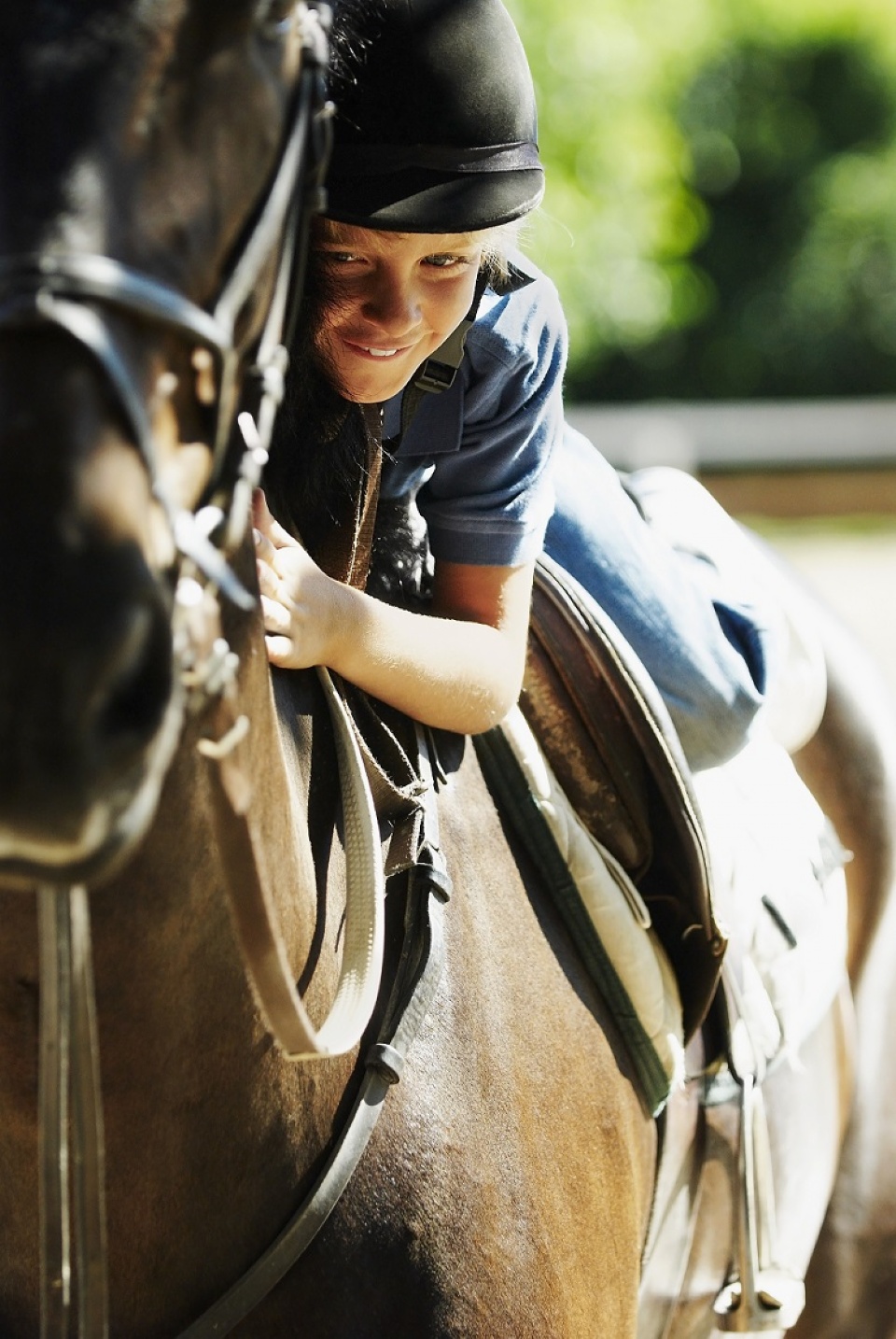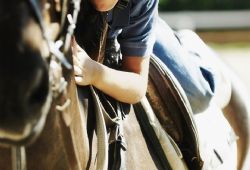Carole Nantel felt this initiative was
worth switching careers for. The accountant turned entrepreneur is the
co-founder of Projet Equestre Goldie,
or Goldie’s Horse Ranch, a non-profit
organization that offers therapeutic horseback riding to children with
disabilities. The aim of the foundation
is to teach the children how to walk by using a horse.
Therapeutic horseback riding is
scientifically proven to help people with autism and with other disabilities who
have trouble walking to train them to walk.
Nantel explains that the movement of a horse’s body when walking is
identical to the movement of a human’s body when walking. “If you sit a child or an adult on a horse,
it’s the same as if he (the person) were to walk himself,” says Nantel. “If you have a child in a wheelchair that
isn’t able to walk, or he walks crooked, it means his brain is not giving him
the appropriate information for his body to function properly. I sit him on the horse and we’ll walk around,
and it’s as if he’s the one walking, so his body and his brain are learning
what a non-handicapped person would learn on his own.”
Nantel was an accountant by trade, when,
16 years ago, her horse Goldie got sick and was not able to be ridden as often
anymore. Nantel did not want to
euthanize Goldie, so she brought the horse to a therapeutic horseback riding
school near the American border. At this
school, Goldie underwent the therapeutic horseback riding therapy and learned
to walk again, leading Nantel to fall in love with the treatment and start her
own foundation.
Projet
Equestre Goldie is a bilingual, non-profit organization located in
Mirabel just west of Highway 148 and offers therapeutic horseback riding to
children aged 3-18. Nantel says the
service does also exist for adults, but she works with children mostly because their
brains are more flexible and easier to teach.
Projet Equestre Goldie is open
for lessons between Wednesday and Sunday and offers around 40 courses per week,
the majority being offered on weekends.
Nantel says appointments are scheduled for
every second week, and that she has partnerships with certain elementary
schools, which involves the school bringing their special needs students to use
the service.
Nantel says the typical session lasts one
hour and will begin with the child coming into the stable and brushing a horse’s
mane. The child will then be fastened up
and put on the horse, where he will then proceed to ride the horse for half an
hour, usually accompanied by Nantel herself.
The session ends with a conversation with the child’s parents.
Nantel says her cost for putting together
one session is $130. Her foundation
offers parents of children who come to use her service the opportunity to pay
just half of that price, $65, while she covers the other half of the cost. Nantel says that covering half the cost means
that she has to raise $120,000 per year, something she is able to do thanks to
several fundraisers, which include two yearly fundraising dinners, and thanks
to several donors, such as the popular Fondation
Martin-Matte.
Nevertheless, Nantel says, raising the
money is difficult every single year.
She is doing everything she can to avoid raising prices and that most parents
are not able to afford paying more than what she already charges. “Raising my prices is not my goal,” she
says. “Parents struggling with
handicapped children have a tremendous amount of fees [for other required
services].” She says that there is a
two-year waiting list in the public medical sector to get help for handicapped
and autistic children and that parents can’t wait that long and are forced to
go into the private sector. “A speech
therapist or an occupational therapist in the private sector can cost between
$90 and $110 per session,” Nantel adds.
“It’s expensive, so we try our best to help them out.”
Nantel says that the best place for people
to donate to her foundation is at the ScotiaBank marathon. She says that ScotiaBank organizes a yearly
marathon in which most non-profit organizations participate. Projet Equestre Goldie will be
participating as well and Nantel says that anything helps. “All donations are appreciated,” she says,
adding that the money gets put directly into the foundation to help pay off the
costs.
Therapeutic horseback riding is an option that works. There is an international committee for the
practice, as well as national committees in several countries, including the
U.S.A. and Canada, and there is even a committee per province in Canada, such
as Quebec’s Fédération Québecoise d'Équitation
Thérapeutique, which includes nine members throughout the province. Nantel says that there is a worldwide
congress held on the subject and that, even though she has not been able to
attend, she is always learning something new and finding new ways to improve
her services and better serve the children in need.

 In The Latest Issue:Latest Issue:
In The Latest Issue:Latest Issue:
- A Bittersweet Farewell
- The new Laval Aquatic Co...
- The End of an Era:
Articles
Calendar
Virtual- ANNUAL TEACHER APPRECIATION CONTEST
- APPUI LAVAL
- ARTS & CULTURE
- CAMPS
- CAR GUIDE
- CCIL
- CENTENNIAL ACADEMY
- CHARITY FUNDRAISING
- CITYTV
- COSMODÔME
- COMMUNITY CONNECTIONS
- COVER STORY
- DINA DIMITRATOS
- ÉCOLE SUPÉRIEURE DE BALLET DU QUÉBEC
- EDITORIALS
- ÉDUCALOI
- EDUCATION
- EMPLOYMENT & ENTREPRENEURSHIP
- FÊTE DE LA FAMILLE
- FÊTE DU QUARTIER SAINT-BRUNO
- FAMILIES
- FESTIVAL LAVAL LAUGHS
- FÊTE DE QUARTIER VAL-DES-BRISES
- FINANCES
- GLI CUMBARE
- GROUPE RENO-EXPERT
- HEALTH & WELL-BEING
- 30 MINUTE HIT
- ANXIETY
- CHILDREN`S HEALTH & WELLNESS
- CLOSE AID
- DENTAL WELLNESS
- EXTREME EVOLUTION SPORTS CENTRE
- FONDATION CITÉ DE LA SANTÉ
- GENERAL
- HEARING HEALTH
- MESSAGES FROM THE HEALTH AGENCY OF CANADA
- MENTAL HEALTH
- SEXUALITY
- SOCIAL INTEGRATION
- SPECIAL NEEDS
- TEENS
- THE NUTRITION CORNER
- THE NUTRITION CORNER - RECIPES
- VACATION DESTINATION
- WOMEN'S FITNESS
- WOMEN'S HEALTH
- HILTON MONTREAL/LAVAL
- HOME & GARDEN
- INTERNATIONAL WOMEN'S DAY
- JAGUAR LAVAL
- LAVAL À VÉLO
- LAVAL FAMILIES TV SHOW
- LAVAL FAMILIES MAGAZINE CARES
- LAVAL URBAN IN NATURE
- LE PARCOURS DES HÉROS
- LES PETITS GOURMETS DANS MA COUR
- LEON'S FURNITURE
- LEONARDO DA VINCI CENTRE
- LFM PREMIERES
- LIFE BALANCE
- M.P. PROFILE
- MISS EDGAR'S AND MISS CRAMP'S SCHOOL
- MISSING CHILDREN'S NETWORK
- NETFOLIE
- NORTH STAR ACADEMY LAVAL
- OUTFRONT MEDIA
- PASSION SOCCER
- PARC DE LA RIVIÈRE-DES-MILLE-ÎLES
- PÂTISSERIE ST-MARTIN
- PIZZERIA LÌOLÀ
- PLACE BELL
- PORTRAITS OF YOUR MNA'S
- ROCKET DE LAVAL
- SACRED HEART SCHOOL
- SCOTIA BANK
- SHERATON LAVAL HOTEL
- SOCIÉTÉ ALZHEIMER LAVAL
- STATION 55
- STL
- SUBARU DE LAVAL
- TECHNOLOGY
- TEDXLAVAL
- TODAY`S LAURENTIANS AND LANAUDIÈRE
- TODAY`S LAVAL
- WARNER MUSIC
- THIS ISSUE
- MOST RECENT
Magazine
Therapeutic Horseback Riding: A Viable Option
Articles ~e 105,7 Rythme FM 4 chemins Annual Teacher Appreciation Contest Appui Laval Arts & Culture Ballet Eddy Toussaint Camps THIS ISSUE MORE...
CONTESTS Enter our contests
CONTESTS Enter our contests
CALENDAR
Events & Activities
COMMUNITY Posts Events
PUBLICATIONS Our Magazine Family Resource Directory
LFM BUSINESS NETWORK Learn more
COUPONS Click to save!
COMMUNITY Posts Events
PUBLICATIONS Our Magazine Family Resource Directory
LFM BUSINESS NETWORK Learn more
COUPONS Click to save!
SUBSCRIPTIONS
Subscribe to the magazine
Un-Subscribe
E-NEWSLETTER Subscribe to our E-newsletter Un-Subscribe
WRITE FOR US Guidelines & Submissions
POLLS Vote today!
E-NEWSLETTER Subscribe to our E-newsletter Un-Subscribe
WRITE FOR US Guidelines & Submissions
POLLS Vote today!
ADVERTISERS
How to & Media guide
Pay your LFM invoice
SUGGESTIONS Reader's Survey Suggest a Listing
LFM About Us Our Mission Giving Back Contact Us
SUGGESTIONS Reader's Survey Suggest a Listing
LFM About Us Our Mission Giving Back Contact Us
 PICK-UP LOCATIONS
Get a copy of LFM!
PICK-UP LOCATIONS
Get a copy of LFM!
TERMS & CONDITIONS Privacy | Terms
ISSN (ONLINE) 2291-1677
ISSN (PRINT) 2291-1677
Website by ZENxDESIGN



 BY:
BY: 
Tweet
Share